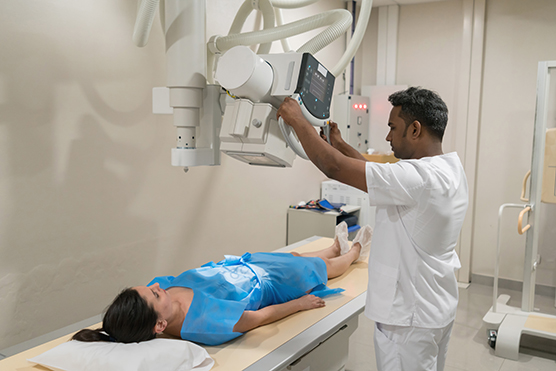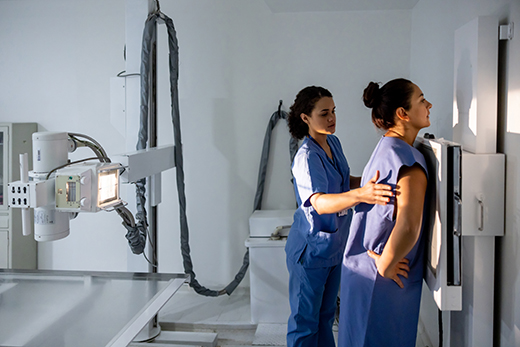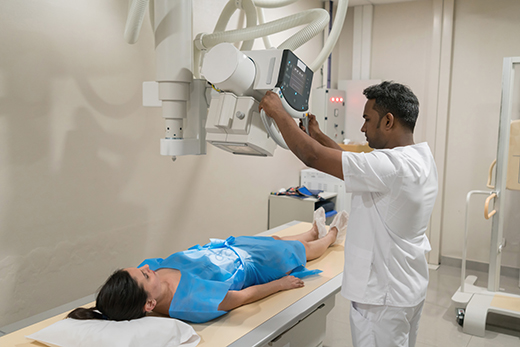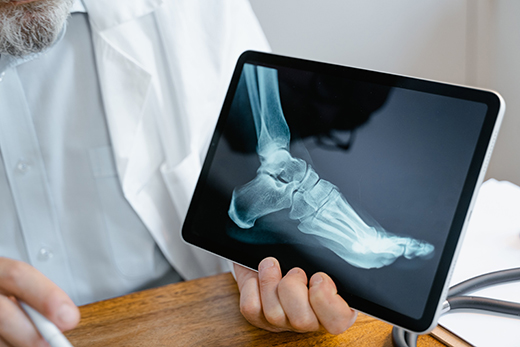X-Ray Radiography
We offer a full range of routine and specialized X-ray services. We’re passionate about personalized care and providing quick results.
Medically reviewed by Elizabeth Morris, M.D. on Nov. 30, 2023.

World-Class Routine and Specialized X-Ray Services
X-ray radiography, or X-ray, is a type of test that creates pictures of structures inside your body. The image it makes is called a radiograph. To create the radiograph, a machine on one side of your body sends X-rays through your body. A detector on the other side of your body detects the X-rays that pass through and creates a radiograph.
The UC Davis Department of Radiology uses state-of-the-art X-ray equipment at many convenient Northern California locations. Our highly trained radiologists are on the leading edge of imaging advancements and research. Many of our imaging clinics take walk-ins for routine X-rays. If you need additional imaging, we also offer CT scan, PET scan and MRI on-site.
X-Ray Services at UC Davis Health
We offer a full range of services that use advanced X-ray techniques for diagnosis. Our radiologists work as a team with all of your providers to give you the best care.
Some types of X-rays require a contrast dye so that certain body structures show up more clearly in your radiograph. If needed, you get an injection or drink a liquid containing the dye before your X-ray.
Breast Mammography
We offer routine 2D and 3D mammograms. We also perform diagnostic X-ray mammography to diagnose breast conditions.
Cardiothoracic (Chest) X-Rays
Our vascular radiologists use minimally invasive X-ray techniques to diagnose and treat chest and vascular conditions, such as lung infections and heart blockages.
Musculoskeletal X-Rays
Our musculoskeletal radiology specialists use advanced X-ray methods to diagnose injuries and diseases in bones, joints, organs and tissues, such as fractures and arthritis.
Interventional Radiology
Our specially trained interventional radiologists treat conditions such as blood clots, gallstones, tumors and uterine fibroids. We use the latest X-ray-guided procedures that require only a tiny pinhole incision.
Request an Appointment
As Sacramento's No. 1 hospital, you'll benefit from unique advantages in primary care and specialty care. This includes prevention, diagnosis and treatment options from experts in 150 specialties.
Referring Physicians
To refer a patient, submit an electronic referral form or call.
800-4-UCDAVIS
Patients
Call to make an appointment.
Consumer Resource Center
800-2-UCDAVIS
Wear comfortable clothing to your appointment. If your X-ray requires a contrast dye, you will get it at your appointment. You will not need sedation, so you don’t need someone else to drive you home. Your radiologist will give you additional instructions to prepare for your X-ray if needed.
-

Before Your X-Ray
You may need to remove some or all of your clothes and put on a gown. Your technician will help position you for your X-ray and make sure you’re comfortable.
-

During Your X-Ray
You won’t feel any pain or other sensations during your X-ray, but you may have side effects if you have contrast dye. A routine X-ray may last only a few minutes. Some procedures may take an hour or longer.
-

After Your X-Ray
After your X-ray, you can get dressed and return to your regular activities. Your results may be ready right away. For some procedures, it may take up to seven days for a specialist to review your radiograph.
Risks of X-Ray Radiography
X-rays use low doses of radiation, which are typically not harmful. However, some X-rays use higher doses of radiation, and radiation exposure can sometimes lead to cancer. Your radiologist can help you understand your dose.
Risk Due to Contrast Dye
Some people have side effects or allergic reactions to contrast dye such as headache, itching, nausea, red skin and rash.
Risk During Pregnancy
If you are pregnant, it is best to avoid X-rays of your abdomen except in emergency situations.
Risk to Children
Children are more sensitive to radiation and have a greater risk of developing cancer from radiation exposure.

Ranked among the nation’s best hospitals
A U.S. News & World Report best hospital in cardiology, heart & vascular surgery, diabetes & endocrinology, ENT, geriatrics, neurology & neurosurgery, and pulmonology & lung surgery.

Ranked among the nation’s best children’s hospitals
U.S. News & World Report ranked UC Davis Children’s Hospital among the best in neonatology, nephrology, orthopedics*, pediatric & adolescent behavioral health, and pulmonology & lung surgery. (*Together with Shriners Children’s Northern California)

Ranked Sacramento’s #1 hospital
Ranked Sacramento’s #1 hospital by U.S. News, and high-performing in aortic valve surgery, back surgery (spinal fusion), COPD, colon cancer surgery, diabetes, gynecological cancer surgery, heart arrhythmia, heart failure, kidney failure, leukemia, lymphoma & myeloma, lung cancer surgery, pacemaker implantation, pneumonia, prostate cancer surgery, stroke, TAVR, cancer, orthopedics, gastroenterology & GI surgery, and urology.

The nation’s highest nursing honor
UC Davis Medical Center has received Magnet® recognition, the nation’s highest honor for nursing excellence.

World-class cancer care
One of ~59 U.S. cancer centers designated “comprehensive” by the National Cancer Institute.

A leader in health care equality
For the 13th consecutive year, UC Davis Medical Center has been recognized as an LGBTQ+ Healthcare Equality Leader by the educational arm of America’s largest civil rights organization.
